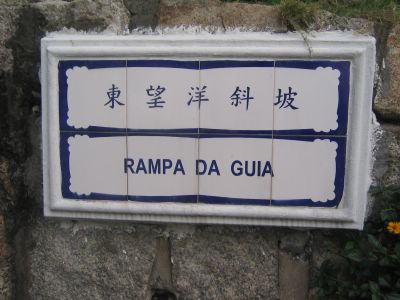
Largo de Senado (Senate Square)
After Wes' visa was approved, we had to plan a trip outside Hong Kong so that we could leave and re-enter to 'activate' the visa. While Hong Kong is part of China, it is treated as a 'Special Administrative Region' (SAR) and has its own immigration policies. For example, 'mainland' Chinese citizens are not allowed to immigrate to Hong Kong without a visa.
Macau is another SAR and is a popular place for expats to visit to fulfill a 'visa run' since it is only an hour away by ferry and Americans can visit there without a visa. Not as internationally well-known as Hong Kong, Macau was formerly a Portuguese Colony (in fact, the oldest European colony in China). Macau became a Chinese SAR in 1999.
Upon our arrival in Macau, we boarded a bus that took us to the historical square of Macau, Largo de Senado. The square was bordered by historical buildings built in the Portuguese style. Also, the street was lined with black and white stones that reminded Annette of Lisbon.

Largo de Senado
Hiking up from the town square, we made it to Monte Fort, which was built by Jesuits in the 17th century. In 1622, one of the priests singlehandedly defended Macau from invading Danish forces with a lucky canon shot that hit the powder supply on one of the Danish ships.

Monte Fort
Next we walked down from the fort to the ruins of St. Pauls' Cathedral, dominated by an ornate facade that tells the story of the church through its many statues and sculptures.

St. Paul Church Facade
While Macau was dominated by Christianity in the 1600's, today it is better known for its casinos. Annette and I decided to check out the Hotel Casino Lisboa, which is one of the most 70s-hideous buildings either of us has ever seen. The hotel lobby was luxuriously furnished with interesting artwork and historical artifacts. We proceeded to the casino but found that we first had to check the backpack that Wes was carrying. But, when Wes got to the bag check, the casino staff searched the bag and attempted to make Wes throw away the snacks and water bottle inside, at which point we decided that it wasn't worth the sacrifice to go into the casino.
As we had just found out, the casino scene in Macau is not quite as customer friendly as Las Vegas. Casinos have strict dress codes, table minimums are quite high (around $35 for a hand of blackjack), the dealers automatically take 10% of your winnings, and there aren't even free drinks for players!
Leaving the hotel Lisboa, we walked to Guia hill, where we paid HK $2 (about $0.25) to ride a small cable car to the top. The hilltop was lined with WWII bunkers, one of which was turned into a museum. Guia hill is also home to the oldest lighthouse on the China coast (ca. 1865).

Guia Hill Lighthouse

Portuguese-style tile street sign

Mosaic on ceiling at Hotel Lisboa
Our last stop in Macau was the Sands casino, which had just opened in the last year. It is part of a new wave of casinos that are more 'Vegas-style'. At the sands Wes was able to check the backpack successfully, so we went inside for a look. The interior of the Sands was felt much more like a Vegas casino, with rows and rows of slot machines and table games, a theatre, and a seafood buffet. We tried our luck at the slot machines but went through our $12 in credits without hitting the jackpot. We thought about staying for the buffet but ultimately decided to catch the ferry back to HK for a relaxing dinner at home.

2 comments:
You should not go to casinos. Check out this site: http://www.guardian.co.uk/china/story/0,7369,1656418,00.html?gusrc=rss
I love gambling in Las Vegas, Atlantic City, and Macau.
Post a Comment